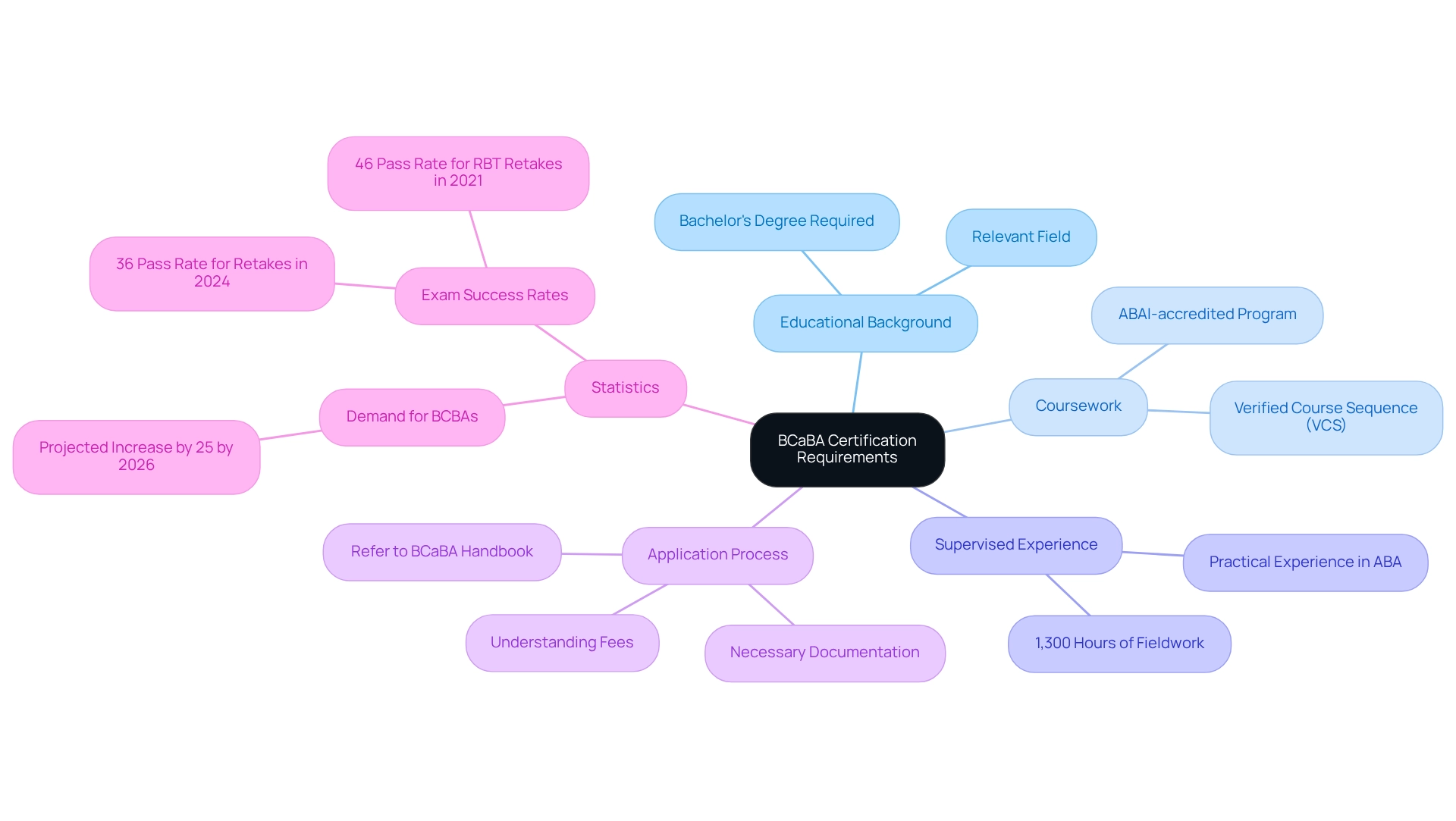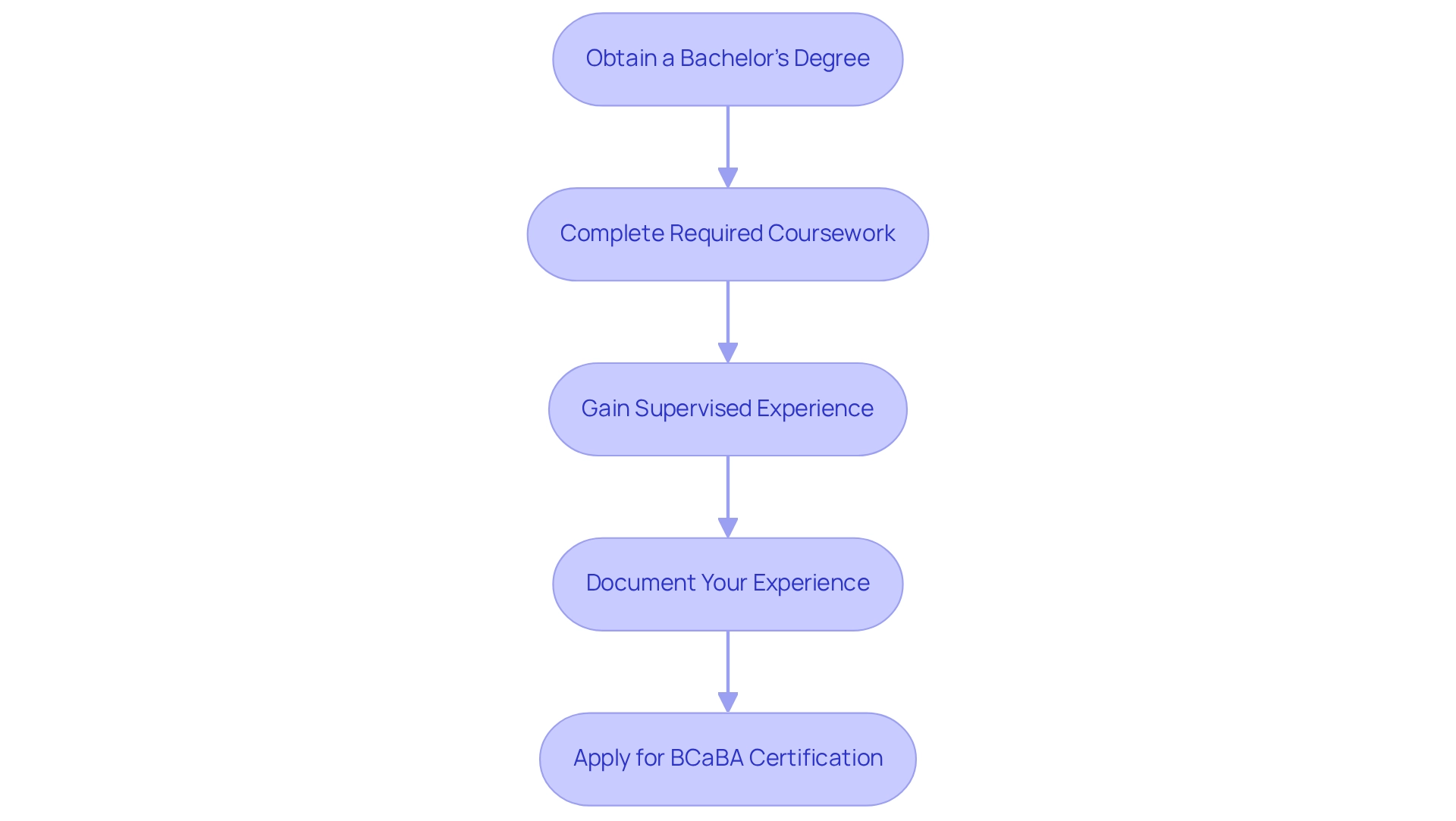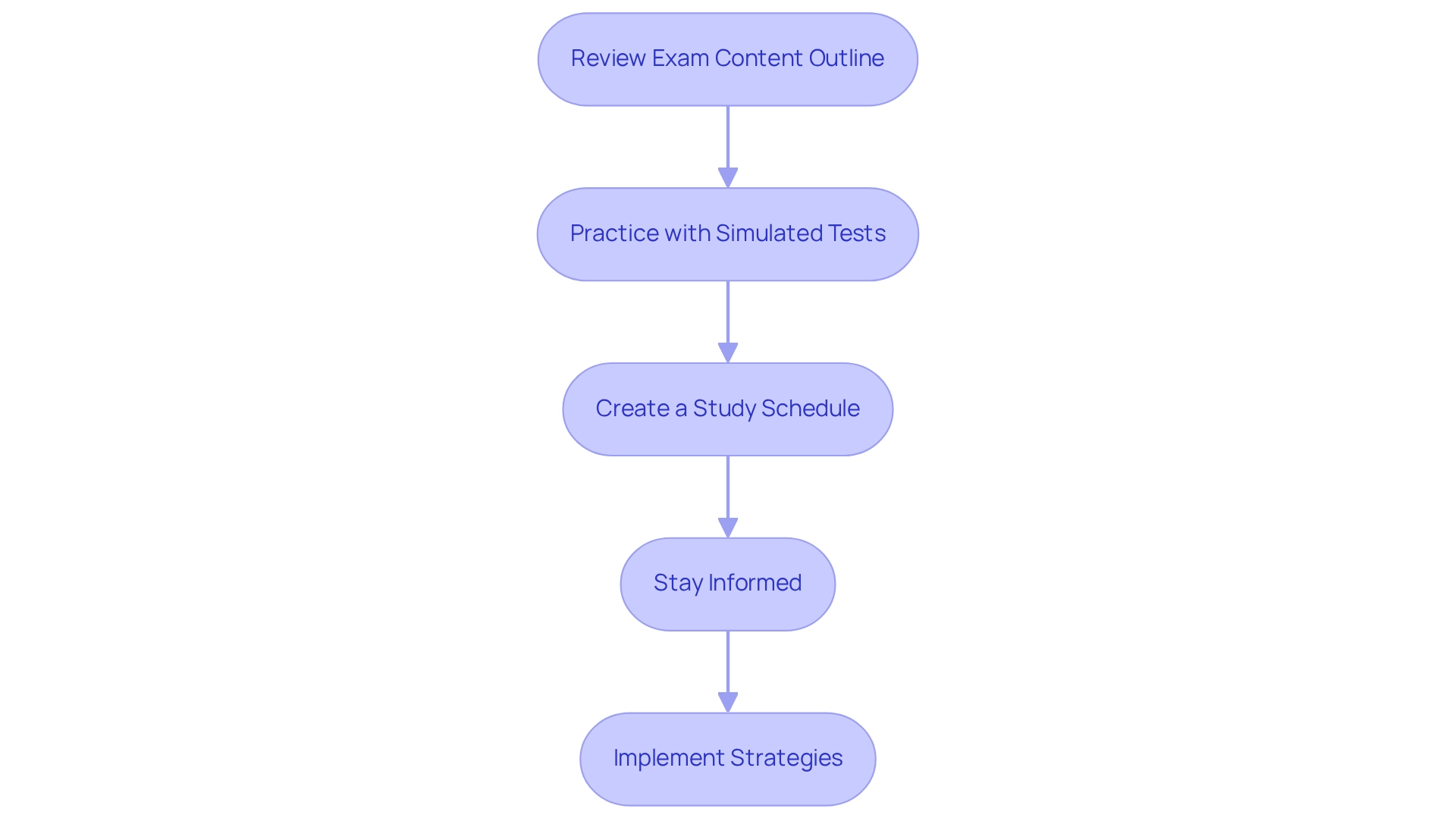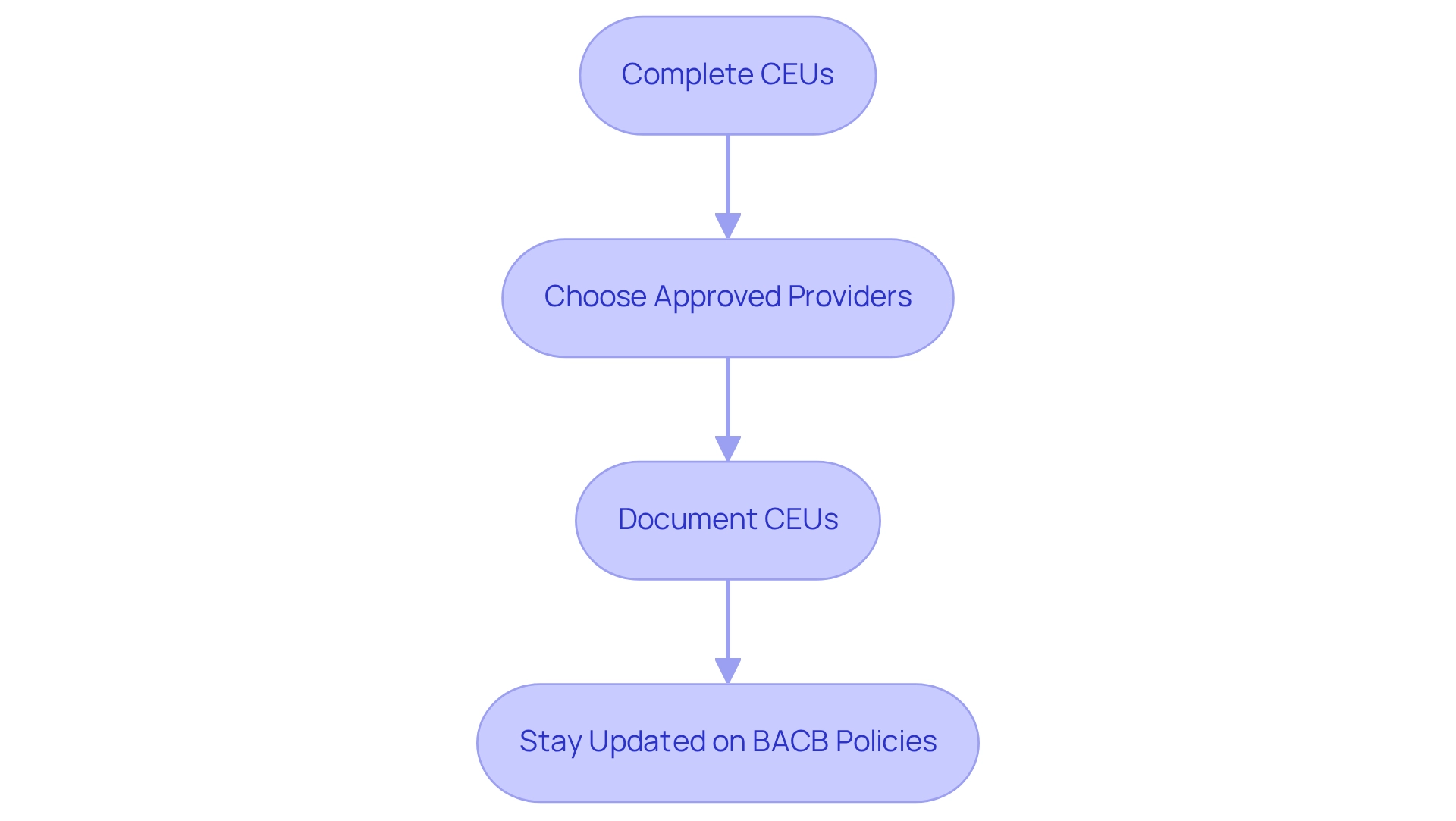May 31, 2025

To successfully achieve BCaBA certification, candidates must meet specific educational requirements, gain supervised experience, and prepare effectively for the certification exam. The increasing demand for behavior analysts underscores the importance of thorough preparation and continuous education. By navigating these steps, candidates can significantly enhance their likelihood of success in the certification process.
Are you ready to take the next step in your career? Embrace the journey towards certification with confidence.
In the ever-evolving field of behavior analysis, aspiring professionals embark on a complex journey toward BCaBA certification. With the demand for Board Certified Behavior Analysts projected to surge, understanding the certification requirements has never been more critical. This article explores the essential steps candidates must take, including:
Additionally, it emphasizes the importance of maintaining certification through ongoing education. By navigating these key components, future behavior analysts can enhance their expertise and contribute to the growing need for skilled practitioners in the field.
To obtain , individuals must thoroughly comprehend the criteria set by the Behavior Analyst Certification Board (BACB). The key components include:
By 2025, the demand for Board Certified Behavior Analysts (BCBAs) is anticipated to rise by 25%. This statistic underscores the significance of bcaba certification in addressing this increasing requirement. However, statistics show that only 36% of individuals who retake the test succeed in 2024, highlighting the difficulties encountered by those seeking qualification.
This situation illustrates the need for improved assistance and resources for individuals retaking qualification exams. Furthermore, applicants should review all subject areas, not only those where they responded inaccurately, to enhance their likelihood of success in upcoming assessments. Comprehending these dynamics can better equip candidates for achievement in their qualification journey.

To fulfill the educational and experience prerequisites for BCaBA certification, adhere to the following steps:
The demand for BCBAs is projected to rise by 25% by 2026. This statistic underscores the importance for aspiring professionals to effectively navigate these requirements. Furthermore, the case study titled "Role of RBTs in ABA Therapy" emphasizes that Registered Behavior Technicians (RBTs) are essential to the delivery of behavior-analytic services. This highlights the significance of a strong foundation in behavior analysis for individuals seeking BCaBA certification as a Board Certified Assistant Behavior Analyst.
Moreover, the decision between BCBA and requires careful consideration of personal and professional aspirations. This reflection guides individuals in making informed choices about their future in the field.

To effectively prepare for and pass , it is crucial to follow these essential steps:

To maintain your bcaba certification, it is essential to adhere to the following requirements: The projected increase of 25% in demand for BCBAs by 2026 underscores the critical need for ongoing education in this evolving field.
Furthermore, a significant percentage of BCBAs complete their CEUs on time, reflecting a commitment to professional development. Successful completion stories from professionals with bcaba certification often emphasize the value of networking opportunities at conferences, where 80% of attendees prefer in-person events for their enhanced learning experiences. Continuous learning and adaptation, as illustrated by B.F. Skinner's foundational work in ABA, are key to effective practice in behavior analysis.

Navigating the path to BCaBA certification is a multifaceted journey that demands dedication, strategic planning, and a clear understanding of essential requirements. Candidates must first meet educational prerequisites by obtaining a relevant bachelor’s degree and completing necessary coursework in behavior analysis. Equally crucial is gaining hands-on experience through supervised fieldwork, which equips aspiring behavior analysts with the practical skills needed to excel in the field.
Preparation for the BCaBA exam is another critical step. By utilizing comprehensive study materials, engaging in practice exams, and adhering to a structured study schedule, candidates can significantly enhance their chances of success. Staying informed about exam updates and content changes ensures that candidates are well-prepared and confident on test day.
Maintaining BCaBA certification through continuing education is vital for professional growth and compliance with evolving standards in behavior analysis. By completing the required CEUs and staying updated on BACB policies, certified professionals can ensure they remain knowledgeable and effective in their practice.
As the demand for Board Certified Behavior Analysts continues to rise, understanding and successfully navigating these steps is essential. By committing to this journey, aspiring behavior analysts not only enhance their own expertise but also contribute to the vital need for skilled practitioners in the field. Embracing the challenges and opportunities that come with BCaBA certification ultimately leads to a rewarding and impactful career in behavior analysis.
What are the educational requirements for obtaining the bcaba certification?
Candidates must have a bachelor’s degree from an accredited institution. The degree does not need to be in psychology or behavior analysis, but it should be relevant to the field.
What specific coursework is required for bcaba certification?
Candidates are required to complete specific coursework in behavior analysis, which can be obtained through an ABAI-accredited program or a Verified Course Sequence (VCS).
How much supervised experience is necessary for bcaba certification?
A minimum of 1,300 hours of monitored fieldwork is necessary, providing essential practical experience in applied behavior analysis.
What is involved in the application process for bcaba certification?
Candidates need to understand the application procedure, including related fees and necessary documentation. For thorough information, it is recommended to refer to the BCaBA Handbook.
What is the anticipated demand for Board Certified Behavior Analysts (BCBAs) by 2025?
The demand for BCBAs is anticipated to rise by 25% by 2025, highlighting the importance of bcaba certification.
What percentage of individuals who retake the bcaba test are expected to succeed in 2024?
Statistics show that only 36% of individuals who retake the test are expected to succeed in 2024.
What should applicants do to enhance their likelihood of success in upcoming assessments?
Applicants should review all subject areas, not only those where they responded inaccurately, to improve their chances of success in the qualification exams.
Our expert recruitment strategies and AI-driven sourcing ensure that you receive top-notch candidates quickly, without compromising on quality. Whether you’re looking for BCBAs, Clinical Directors, or RBTs, we’ve got you covered.